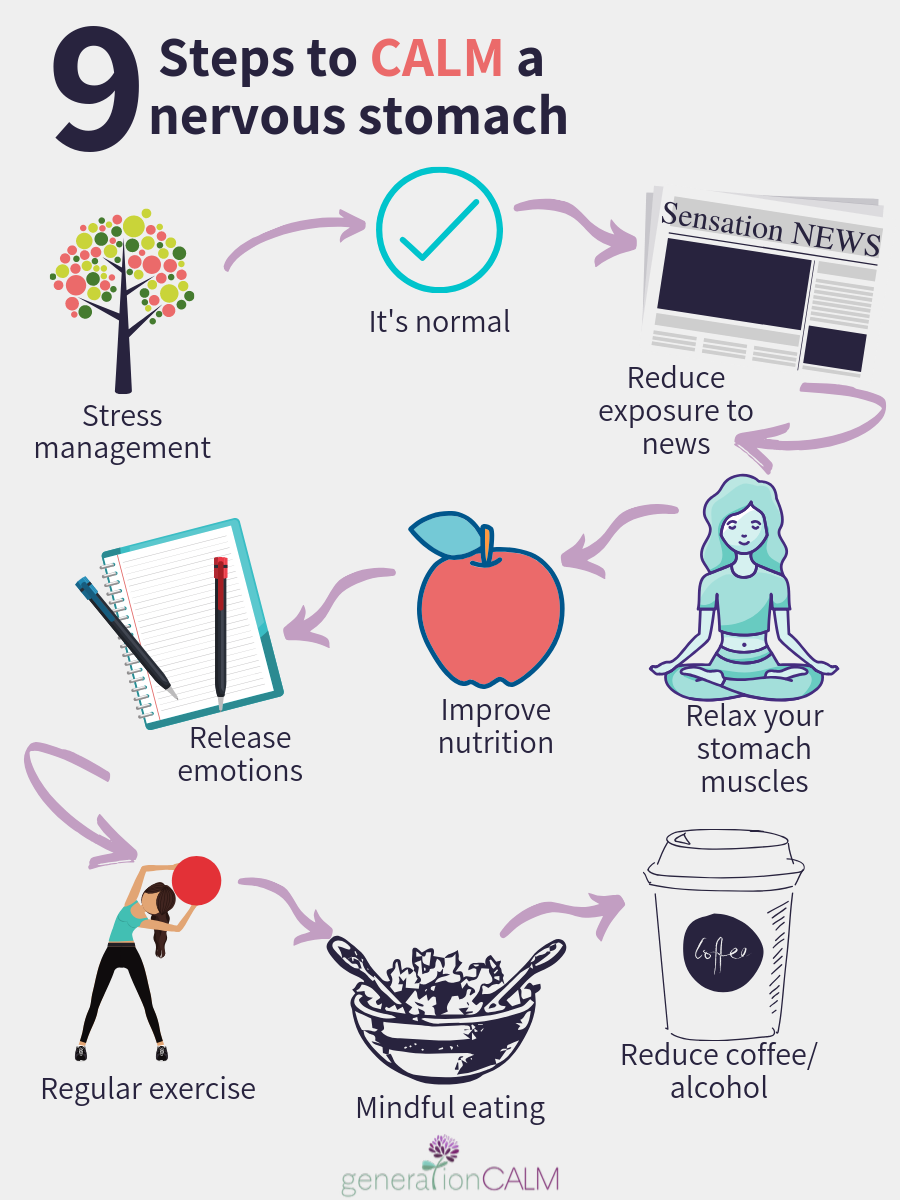How to calm a nervous stomach
Imagine you’re about to walk into an interview for your dream job …when you get the unmistakable feeling … you need to poop!
Everyone shows anxiety in a different way. But one universal area is in the stomach. Whether it’s butterflies in your tummy or the muscles tensing up like a knot in your stomach. Sometimes it can be cramps and bloating.
So why do we get a nervous stomach and what can we do about it?
Why does anxiety upset my stomach?
When feeling anxious, your body calls ‘code red’, and all the essential systems used in flight or flight get put on high alert. Blood starts pumping faster to reach the large muscle groups, your pupils get larger so you can see the enemy better, blood sugar is released to create more energy for action.
But guess which system gets shut down, because it’s not necessary in an emergency situation? Yep, your digestive system!

So this upsets your stomach in two ways:
- Because blood flow is reduced to the digestive system, you may begin to experience nausea, nervous belly, dry throat and stomach cramps.
- The stress hormones travel to your gut which increases your gut motility (that’s fancy speak for need to poop more than usual).
These changes are temporary and a nervous tummy will disappear once the event is over. In the case of an interview, it will probably disappear the moment you are in the room.
The mind-body association
If you feel nervous your digestive system plays up.
And if you hold tension in your stomach – your brain interprets that as feeling anxious and your digestive system still plays up.
Either way it results in a nervous belly.
Now you can’t really shut off feeling nervous if there’s something to be anxious about. But you can tell yourself that it is NORMAL.
If you hold tension in your stomach…then allow yourself to let your muscle tension go. It takes some practice, but you can do it. Practice progressive muscle relaxation or try this guided stomach relaxation.
At various times during the day, when I’m going about my daily activities, I’ll bring attention to my stomach. Notice if I’m holding tension there – then let it go. I let my belly hang loose. And the release feels so good.
What about irritable bowel syndrome?
Irritable Bowel Syndrome (IBS) is a ‘stress-sensitive’ gut disorder that affects 10-15% of adults. It is a functional disorder, which means tests of the intestinal tract look normal and healthy, yet the bodily processes are irregular or different to usual. Having a nervous belly is different to IBS. A nervous belly occurs only when you anticipate a nerve wracking event, but IBS is chronic and occurs for 3 months or longer.
IBS can create terrible abdominal discomfort such as cramping, diarrhea or constipation that interferes with normal daily activities. Although there is no clear cause, the symptoms are very real. These symptoms can come and go, flare up or become chronic causing great distress because you never know when they will arrive and ruin a day.
Irritable bowel syndrome is tightly associated with stress and anxiety with greater psychological distress resulting in greater symptoms. The stress doesn’t cause IBS, but rather aggravates the symptoms.
It is now thought that continual distress (e.g. an unhappy marriage) or chronic stress (like ongoing work issues) activates the immune system. The body thinks the stress is a real threat and prepares to fight it. This ongoing immune activation affects the gut. Having the immune system activated for so long can change the composition of the gut microbiome, which may then create further physical symptoms.
Many people with IBS are prescribed medications, that ironically enough, further inflame the gut. But a study on a new psychological treatment has found some promising results.
Psychological treatment for IBS
Researchers at Wayne State University conducted a study in 2017 on a specialized form of talking therapy called Emotional Awareness and Expression Training (EAET), which helps people to recognize and express their emotions fully.
They compared the treatment to relaxation training and a control group of patients on a waiting list. Both the EAET and relaxation groups received three 50-minute training sessions delivered once a week.
At the end of the 10-week follow-up period 63% of the people in the EAET group reported significant improvements in their IBS symptoms compared to those in the relaxation and waiting list groups.
What is EAET and could these results help you?
The EAET group were provided with specific skills to improve emotional expression such as learning how to describe their feelings about others. They were also encouraged to express their emotions directly in person.
If you are someone who tends to suppress emotions because you don’t want to hurt other people’s feelings, then it’s time to do something about it, because it could be physically affecting your health. Some people are so good at hiding their feelings that others find it difficult to believe you are suffering. But this only increases the isolation and overwhelm.
You can start the process of accepting and expressing your emotions by starting a journal. (I have a video called How to Start Journaling). This can increase your awareness of what are you feeling in the moment. It will allow you to observe your emotions and feel free to write them down.

9 steps to calm a nervous stomach
Don’t wait around for the next time the butterflies strike, learn how to settle your nervous stomach today.
- Reduce your reaction to stress. We are reactionary creatures, which means we wait for the stress to happen – then react to the problem. However, being more proactive can help prevent the stress from building up. A balanced diet, regular exercise, getting outdoors for 20 minutes per day, all give you a healthy lifestyle and strengthens your fight against stressful situations.
- Remember that getting anxious is completely normal and unavoidable. Your body is looking after you. When the stressful situation is over or you make an action towards resolving the anxiety in some way, the nervousness will work its way out of your body. Remember, a nervous stomach is a normal reaction to anxiety, it will go away.
- Reduce your constant exposure to unconscious stress. Only read or watch the news at certain times, don’t watch tense TV shows before bed, unfriend people on social media that create stress for you, limit your time in noisy environments. Unconscious stress gnaws away at your brain without you even being aware of it. Why some doctor or dentist waiting rooms play news 24/7 is beyond my comprehension. Your brain is processing the stress even if you’re not aware of it
- Relax your stomach muscles. Start to notice the tension you hold in your stomach and gently let it go. Imagine the tension melting away. You can use longer relaxation exercises such as progressive muscle relaxation to help with this. But try mini-relaxations throughout the day, such as visualizations, belly-breathing, guided meditations, body scans or listening to your favorite relaxing music. When you hold muscle tension in your stomach a message is sent to your brain that you feel stressed. So just a few minutes a day of relaxation can decrease muscle tension, abdominal pain and discomfort. You can learn how to release the muscles in your stomach.
- Improve your nutrition. There is constant communication between the brain and the gut, so surely good nutrition will help. Probiotics have been shown to reduce the inflammation inside the stomach. You may not feel like eating when nervous, so don’t push it. But try to eat whole foods and foods rich in probiotics in your normal, balanced diet, such as yoghurt, and fermented food and drinks like kefir and sauerkraut, and switching to sourdough bread. Cut out processed food where possible.
- Release emotions by writing in a journal. When emotions are suppressed, they don’t go away, they show up in the body. If you find it hard to express what you are feeling start a journal. It will help you become aware of your feelings and emotions as you start to write about them.
- Keep up regular exercise. Walking is a good place to start, advancing to more rigorous aerobic exercise when you are ready. Exercise has a two-fold effect. It keeps your bowels regular and it reduces stress.
- Mindfully eat. Slow down mealtimes to fully appreciate your food. Laura Tilt, a dietitian and health writer, believes mindfulness can also help you lose weight. Mindful eating is paying attention to the food before, during and after eating. Taking notice of how the food looks, how it tastes, how it smells, sounds and the texture of how it feels in your mouth. And assessing how your body feels before and after food, without judgement. I have a delicious video to help you mindfully eat chocolate.
- Cut back on caffeine and alcohol. Caffeine is a natural laxative and anxiogenic drug (causes anxiety). So drink no more than 2 coffees a day. And plan ahead for a stressful day so you’re not tempted to reach for more coffee or Cokes to wake you up. Similarly, too many alcoholic drinks can increase irritate the GI lining and increase IBS symptoms.
It’s impossible to avoid stress in life. But you can do something about how it affects your body. Use these ideas to help yourself become more in control of your nervous stomach.
Like this post? I’d love for you to follow me on Pinterest and pin it for later!


